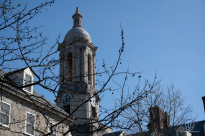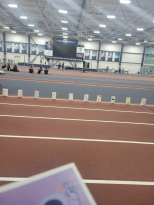Young conductor uses baton to teach
Standing straight in full black attire, Matthew Sheppard held the power of silence in his raised arms.
The dimly lit recital hall remained a moment paused in time as the lights focused on the orchestra and its conductor. Holding so much power on the end of his needle-sized conductor’s baton, Sheppard broke the silence with an emphatic, spontaneous movement. With one wave of the baton, he created something beautiful.
Sheppard’s graduate recital on March 21 in the Esber Recital Hall marked the beginning of the end for his seven-year musical journey at Penn State. At his recital, his fiancée, Maria Arrua, stood in front as the violin soloist, quieting the crowd with the elegance of her performance. Sheppard calls her a “master violin student” with such heaviness it almost seems he can’t express that thought enough.
Three weeks after his recital, with his 53-page thesis ready to edit and turn in, Sheppard is so close to graduating he can almost hear the final note around the corner.
With a smile stretching across his small office in Music Building I, Sheppard said he had just finished his “orals” that morning, which consisted of a few faculty members asking him about almost everything he has ever learned. The unnerving final test did not seem to shake the well-versed Sheppard, who said he was “feeling good” with how he did.
He has undergraduate degrees in violin performance, music education and liberal arts, all from Penn State, and after his thesis on the late Romantic composer Gustav Mahler is turned in, he will look back on a college career that not many college students can probably relate to.
Sheppard currently serves as an assistant conductor for the Penn State Philharmonic and Chamber Orchestras, co-conductor of the Campus Orchestra, orchestra director at Juniata College, music director of the Unitarian Universalist Fellowship of Centre County and assistant conductor of the Central Pennsylvania Youth Orchestra. He also teaches private violin lessons. Though he has turned his career toward conducting, he has also earned awards for violin performances, including three Jury Recognition Awards for outstanding performance on end-of-semester playing exams.
As someone impassioned for performing, teaching and conducting, Sheppard said he had to choose whether to pursue a professional career in conducting or performing. He chose conducting.
“When you’re on the podium, you are teaching,” Sheppard said. “You’re not teaching them their instruments. You’re teaching them your interpretation of the piece.”
When preparing a piece of music to conduct, Sheppard’s process is long and intricate. The conductor’s job is not only to know every part of the piece for every musician, but it is also to prepare a kind of artful interpretation to how it will be played. Sheppard said that even the history and background of the musical piece must be considered – even how the composer felt about it, or what other pieces of music they may have been working on at the same time that were influencing them.
In his career studying conducting, Sheppard said the best learning experiences have come from workshops he participated in, such as ones in Illinois and the Czech Republic. In Kroměříž, Czech Republic, he participated in a 2 ½-week workshop with conducting teacher Don Schleicher, and was then invited twice to participate in workshops with Schleicher at the University of Illinois. Sheppard said these experiences were perhaps the most valuable for him as a student because he received instant feedback in the middle of conducting an orchestra – and was then able to correct himself and try new methods while conducting.
Other prime learning instances for Sheppard as a teacher come when he is trying to conduct a band of “young musicians,” as he prefers to call them. While he admits he can struggle with teaching an elementary or middle school student the techniques of the violin, these moments can be an eye-opening experience to tell him how something should be taught.
“If you can rehearse a group of eight to 12-year-olds for two and a half hours on Saturday morning, you can do anything,” he said with a smile. “With those kids – the energy – it’s infectious. It’s great.”
Once upon a time Matt Sheppard was just like one of those kids he has now taught. Growing up in Pittsburgh, his parents were both “well-rounded appreciators of music,” he said. But his passion for music didn’t come to him early. When he first tried piano, he gave it up. After beginning violin in the fourth grade, he stuck with it through elementary and middle school, but it wasn’t until his last two years of high school when he really considered taking his music education further, he said.
Conducting and performing music isn’t everything for him either. When he’s not researching a piece of music such as Italian composer Ottorino Respighi’s Trittico Botticelliano – one of his favorites – he enjoys reading about almost every other subject. Sheppard’s appreciation for all subjects also complements his appreciation for all kinds of music. While he said that he listens to classical music often, he also enjoys classic rock groups such as Jethro Tull, Billy Joel, Bruce Springsteen and Queen.
“I very strongly think that there is good music and bad music in every genre,” Sheppard said.
As he reached for one of his several batons in his office, Sheppard admitted he now spends “a lot of time in front of the mirror” practicing his conducting. With a spontaneous burst of enthusiasm, he bounced in front of one of his two mirrors and pretended to practice his conducting.
When he’s in front of a real orchestra of musicians, the slightest change in his energy or movements can affect an entire piece, he said.
“If my energy is right, it will go well,” he said. “If my energy is a little off, I can sense it from them.”
In fact, Sheppard’s unchallenged energy is what stands out in his conducting – even in rehearsal. In a rehearsal for the Campus Orchestra, for example, in a span of 20 seconds Sheppard will instruct the orchestra on what part to play, conduct several seconds of the piece, and then abruptly stop the music in order to correct certain sections for various problems. After he tells the woodwinds to listen to the cellos or instructs the violins to play together, he raises his baton and tells everyone where to start again – all in the same breath.
His energy is infectious.
Molly Eckman, who plays the French horn for the Campus Orchestra, said Sheppard’s emotion and energy directly benefits the musicians.
“It kind of shows me what kind of emotions to play, where to crescendo and other things like that,” Eckman (freshman-bioengineering) said.
When he’s conducting, Sheppard’s carefully moving arms seem almost separate from his violently moving body, and it seems like he’s putting all his effort into not throwing his entire body into the first row of violins and violas.
Even in this violent enthusiasm, the sleeves on his dark blue dress shirt never unravel from their rolled up position and not one of his short black hairs move out of place. Like a cyclist racing to the finish line – a hobby that he also enjoys – Sheppard looks as though he should be sweating bullets.
The reason he’s not losing control, though, is because this is his life’s work. This energy has been practiced over years and years, and now he has reached a point where he can summon it for his students.
“Lots of energy every time – not just when I’m staring at you,” Sheppard told the orchestra after a few seconds of musical energy that wasn’t quite up to his level.
After students took a break outside in the middle of the rehearsal, Sheppard ushered his flock back inside, waving his arms as if conducting them in their walking.
A violinist for the Campus Orchestra, Kate Williams echoed other students as she discussed Sheppard’s energy and intensity.
“He’s really into what he does,” Williams (sophomore-wildlife and fishing science) said.
First-chair clarinetist for the orchestra Jillian Beaver said Sheppard’s enthusiasm not only makes the music better, but it is a characteristic unique to him.
“His conducting is what gives the music emotion,” Beaver (sophomore-biobehavioral health) said. “The whole orchestra moves with Matt.”
As for Sheppard’s immediate future, he applied various doctoral programs and jobs across the country in the hope of working toward his goal of a full-time conducting position at a university level. He and his fiancée considered taking offers in places such as Washington or Boulder, Colo., but they have recently made their ultimate decision to continue studying with Schleicher at the University of Illinois next year.
All he has to do is finish his thesis, pack up his violin and head off to wherever the music moves him next.








